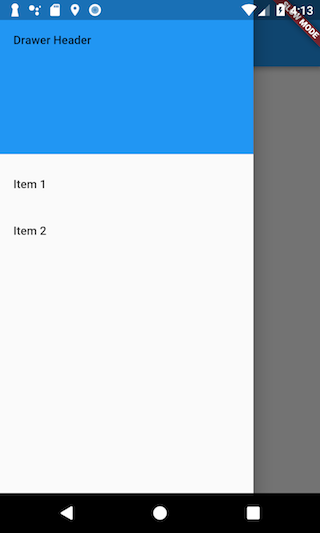在螢幕中加入抽屜 (Drawer)
在使用 Material Design 的應用程式中, 有兩種主要的導覽方式:分頁(tabs)與抽屜(drawers)。 當空間不足以支援分頁時, 抽屜就是一個很方便的替代方案。
在 Flutter 中,可以結合 [Drawer][Drawer] 元件與 [Scaffold][Scaffold],來建立具有 Material Design 抽屜的版面配置。 本教學將依照以下步驟進行:
- 建立
Scaffold。 - 加入抽屜(drawer)。
- 在抽屜中加入項目。
- 以程式方式關閉抽屜。
1. 建立 Scaffold
#要在應用程式中加入抽屜,請將其包裹在 [Scaffold][Scaffold] 元件中。 Scaffold 元件為遵循 Material Design 指南的應用程式 提供一致的視覺結構。 它同時支援特殊的 Material Design 元件(Material components),例如 Drawer、AppBar 以及 SnackBar。
在這個範例中,會建立一個帶有 drawer 的 Scaffold:
Scaffold(
appBar: AppBar(title: const Text('AppBar without hamburger button')),
drawer: // Add a Drawer here in the next step.
);2. 新增抽屜 (Drawer)
#現在,將抽屜 (Drawer) 加入Scaffold。抽屜可以是任何元件(Widget),但通常建議使用 [material library][material library] 中的 Drawer 元件(Widget),因為它遵循 Material Design 規範。
Scaffold(
appBar: AppBar(title: const Text('AppBar with hamburger button')),
drawer: Drawer(
child: // Populate the Drawer in the next step.
),
);3. 在抽屜中加入項目
#現在你已經有了Drawer,接下來可以為其加入內容。 在這個範例中,請使用 [ListView][ListView]。 雖然你可以使用Column元件(Widget), 但ListView非常方便,因為當內容超過螢幕可顯示的範圍時, 它允許使用者在抽屜中進行捲動。
請在ListView中加入一個 [DrawerHeader][DrawerHeader] 以及兩個 [ListTile][ListTile] 元件(Widgets)。 若需更多有關操作清單的資訊, 請參閱 [list recipes][list recipes]。
Drawer(
// Add a ListView to the drawer. This ensures the user can scroll
// through the options in the drawer if there isn't enough vertical
// space to fit everything.
child: ListView(
// Important: Remove any padding from the ListView.
padding: EdgeInsets.zero,
children: [
const DrawerHeader(
decoration: BoxDecoration(color: Colors.blue),
child: Text('Drawer Header'),
),
ListTile(
title: const Text('Item 1'),
onTap: () {
// Update the state of the app.
// ...
},
),
ListTile(
title: const Text('Item 2'),
onTap: () {
// Update the state of the app.
// ...
},
),
],
),
);4. 以程式方式開啟抽屜(drawer)
#通常,你不需要撰寫任何程式碼來開啟drawer, 因為當leading元件(Widget)為 null 時,AppBar 的預設實作就是DrawerButton。
但如果你想要更自由地控制drawer, 可以透過Builder呼叫Scaffold.of(context).openDrawer()來達成。
Scaffold(
appBar: AppBar(
title: const Text('AppBar with hamburger button'),
leading: Builder(
builder: (context) {
return IconButton(
icon: const Icon(Icons.menu),
onPressed: () {
Scaffold.of(context).openDrawer();
},
);
},
),
),
drawer: Drawer(
child: // Populate the Drawer in the last step.
),
);5. 以程式方式關閉抽屜(drawer)
#當使用者點擊某個項目後,你可能會希望自動關閉抽屜(drawer)。 你可以透過使用 [Navigator][Navigator] 來達成。
當使用者開啟抽屜時,Flutter 會將該抽屜加入導覽堆疊(navigation stack)。 因此,若要關閉抽屜,只需呼叫 Navigator.pop(context) 即可。
ListTile(
title: const Text('Item 1'),
onTap: () {
// Update the state of the app
// ...
// Then close the drawer
Navigator.pop(context);
},
),互動範例
#此範例展示了一個 [Drawer][Drawer],如同它在 [Scaffold][Scaffold] 元件(Widget)中被使用的情境。 [Drawer][Drawer] 內包含三個 [ListTile][ListTile] 項目。 _onItemTapped 函式會變更被選取項目的索引,並在 Scaffold 的中央顯示對應的文字。
import 'package:flutter/material.dart';
void main() => runApp(const MyApp());
class MyApp extends StatelessWidget {
const MyApp({super.key});
static const appTitle = 'Drawer Demo';
@override
Widget build(BuildContext context) {
return const MaterialApp(
title: appTitle,
home: MyHomePage(title: appTitle),
);
}
}
class MyHomePage extends StatefulWidget {
const MyHomePage({super.key, required this.title});
final String title;
@override
State<MyHomePage> createState() => _MyHomePageState();
}
class _MyHomePageState extends State<MyHomePage> {
int _selectedIndex = 0;
static const TextStyle optionStyle = TextStyle(
fontSize: 30,
fontWeight: FontWeight.bold,
);
static const List<Widget> _widgetOptions = <Widget>[
Text('Index 0: Home', style: optionStyle),
Text('Index 1: Business', style: optionStyle),
Text('Index 2: School', style: optionStyle),
];
void _onItemTapped(int index) {
setState(() {
_selectedIndex = index;
});
}
@override
Widget build(BuildContext context) {
return Scaffold(
appBar: AppBar(
title: Text(widget.title),
leading: Builder(
builder: (context) {
return IconButton(
icon: const Icon(Icons.menu),
onPressed: () {
Scaffold.of(context).openDrawer();
},
);
},
),
),
body: Center(child: _widgetOptions[_selectedIndex]),
drawer: Drawer(
// Add a ListView to the drawer. This ensures the user can scroll
// through the options in the drawer if there isn't enough vertical
// space to fit everything.
child: ListView(
// Important: Remove any padding from the ListView.
padding: EdgeInsets.zero,
children: [
const DrawerHeader(
decoration: BoxDecoration(color: Colors.blue),
child: Text('Drawer Header'),
),
ListTile(
title: const Text('Home'),
selected: _selectedIndex == 0,
onTap: () {
// Update the state of the app
_onItemTapped(0);
// Then close the drawer
Navigator.pop(context);
},
),
ListTile(
title: const Text('Business'),
selected: _selectedIndex == 1,
onTap: () {
// Update the state of the app
_onItemTapped(1);
// Then close the drawer
Navigator.pop(context);
},
),
ListTile(
title: const Text('School'),
selected: _selectedIndex == 2,
onTap: () {
// Update the state of the app
_onItemTapped(2);
// Then close the drawer
Navigator.pop(context);
},
),
],
),
),
);
}
}
